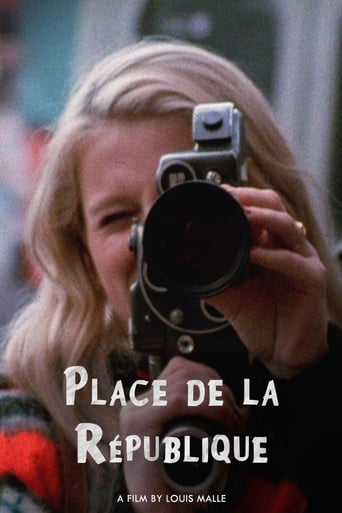FilmCriticLalitRao
The title of French director Louis Malle's documentary film "Place De La République" can be interpreted in two distinctly different manners.For many viewers it is a decent documentary film about a famous area in Paris known as "Place De La République".Those who know French language well and are well versed with various subtle intricacies of French culture would not forfeit even a single minute to make out that this title is talking about the status of the French republic as a nation. Louis Malle has nicely blended these two elements while filming his film by choosing "Place De La République" area for a film shoot and republic of France as its political focus.Although the primary focus is on Paris as a French city,concerns of France as a country have not been overlooked as viewers get to hear and see many regional voices from different French areas.One big problem with this film is that Louis Malle follows a very primitive,raw form of documentary film making in which there is no narration.His choice of interviews is also very haphazard and it discourages viewers to form any kind of cohesive association with various people's lives which have been filmed.Louis Malle was a better director of fiction films but his documentary films also deserve to be watched as they provide interesting glimpses about how human beings behave in a social environment.However,this aspect is not fully developed in this film.
Martin Teller
It's an intriguing experiment. Go up and down a couple of blocks on a busy Parisian street and strike up conversations with random people. Malle stops to chat with all kinds: retirees, shoppers, homeless, immigrants, salespeople, and one woman who says "I'm not racist" and then proceeds to say some pretty racist stuff. There's no common thread to the questions asked, just getting people to talk about their lives, their frustrations, their opinions. It's such a simple documentary concept that you wonder why it isn't done more often. After a while it becomes apparent: a little of this goes a long way, but 90 minutes goes too far. Like HUMAIN, TROP HUMAIN, this film eventually wears out its welcome and even the cameraman and editor seem to get restless. It's not that the discussions are too mundane (some are quite interesting and/or charming), it's just not enough to sustain one's interest for that long.
billheron53
A voice-over explains: "The concept was simple: with camera and microphone in plain view, we struck up conversations with passers-by." The French word used is "des inconnus"— "unknown people"— which can have the sense of "strangers," "mere nobodies," or even the mathematical concept of "an unknown quantity." At another point the film makers tell one person, "It's about people in the street." Early in the film an older lady, retired, with a son and granddaughter, and "very happy," is astonished that the film makers are attempting to make a film without actors playing roles or to make a documentary without commentary. The film makers point out that she herself is at that moment providing the commentary. She seems delighted at the realization.What follows for one and a half hours is about thirty-five encounters filmed over a fifteen-day period— a diverse range of people, many of whom willingly tell about their background, and some of whom discuss the very basis of their outlook on life. Some are decidedly odd. Many mention or give accounts of experiencing profound loss (some very recent), hardship, difficulty, or discomfort. Yet everyone is carrying on— some a little pathetically,— some gallantly, even beautifully. Some, whose personal situation might make a pitiful character in a fiction, are absolutely charming. All have dignity. All describe themselves as resigned, accepting, content, and even quite happy.The film ends with a second encounter with a talkative woman pushing a bicycle. Her long and rambling story draws small crowds, and would seemingly have continued indefinitely if the film makers had been able to keep up with her on her bicycle. She rides beyond their range, and a quote from Raymond Queneau appears, translated as: "'Why,' he said, 'should one not tolerate this life, when so little suffices to deprive one of it?'" Without using scripted actors or commentary, the film succeeds as a tribute to the strength of the human spirit.
Film_critic_Lalit_Rao
The title of French director Louis Malle's documentary film "Place De La République" can be interpreted in two distinctly different manners.For many viewers it is a decent documentary film about a famous area in Paris known as "Place De La République".Those who know French language well and are well versed with various subtle intricacies of French culture would not forfeit even a single minute to make out that this title is talking about the status of the French republic as a nation. Louis Malle has nicely blended these two elements while filming his film by choosing "Place De La République" area for a film shoot and republic of France as its political focus.Although the primary focus is on Paris as a French city,concerns of France as a country have not been overlooked as viewers get to hear and see many regional voices from different French areas.One big problem with this film is that Louis Malle follows a very primitive,raw form of documentary film making in which there is no narration.His choice of interviews is also very haphazard and it discourages viewers to form any kind of cohesive association with various people's lives which have been filmed.Louis Malle was a better director of fiction films but his documentary films also deserve to be watched as they provide interesting glimpses about how human beings behave in a social environment.However,this aspect is not fully developed in this film.


 AD
AD
